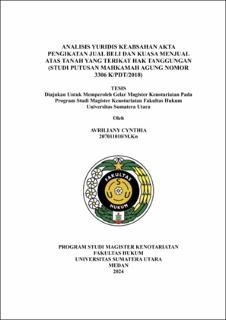| dc.contributor.advisor | Sembiring, Rosnidar | |
| dc.contributor.advisor | Suprayitno | |
| dc.contributor.advisor | Sembiring, Idha Aprilyana | |
| dc.contributor.author | Cynthia, Avriliany | |
| dc.date.accessioned | 2024-09-23T08:39:23Z | |
| dc.date.available | 2024-09-23T08:39:23Z | |
| dc.date.issued | 2024 | |
| dc.identifier.uri | https://repositori.usu.ac.id/handle/123456789/97548 | |
| dc.description.abstract | The legal basis of the existence of Sale and Purchase Binding (PJB) Deed and the power of attorney to Sell are regulated under Article 1320 of the Civil Code. The legal basis provides freedom for the parties to bind themselves only to the extent agreed upon and as long as it meets the requirements. Based on the Decree of Supreme Court No. 3306 K/Pd/G/2018, the lawsuit was filed because the initial legal act in the agreement is in the form of Mortgage Right. However, since the legal act was still binding, the defendant submitted to draw up a full-paid PJB Deed and the power of attorney to Sell. Problems arise when the plaintiff stated and admitted that he had never both made a sale and purchase binding transaction and received a full payment of the mortgage object. In the State Court and High Court, the judge granted the plaintiff's lawsuit in part and declared PJB Deed and power of attorney to Sell null and void, while at the Cassation level, the judge of Supreme Court stated otherwise. The problems of this research are the validity of the full-paid PJB Deed and the Power to Sell the land bound by individual HT (mortgage right), the notarial liability toward the full-paid PJB Deed and the Power to Sell the object bound by individual mortgage right according to UUJN, analysis of judge's legal consideration in Supreme Court Decree Number 3306 K/Pd/2018 juncto Surakarta State Court Decree Number 115/Pdt.G/2017/Pn.Skt regarding the full-paid PJB deed and the power to sell the land bound by HT.
The analytical descriptive research is conducted using normative juridical approach. The research employs primary, secondary, and tertiary legal materials. The research data are collected through literature studies. Data obtained are analysed using qualitative data analysis method.
The results of the research indicate that the validity of PJB deed and the Power to sell which is bound by HT is reviewed based on the provisions of Article 1320 of the Civil Code, the deed that does not meet the objective conditions is null and void, and according to Article 20 points (2) and (3) of the UUHT, PJB deed and the power of to sell that does not meet these conditions is null and void, the notarial liability is referred to the liability as regulated in articles 1365, 1366 and 1367 of the Civil Code as well as administrative liability as regulated in Article 91 A of UUJN. In addition, the analysis of the judge's consideration in the Supreme Court decree on PJB deed and power to sell the land bound by HT is that it is considered less appropriate according to Article 1320 of the Civil Code and Article 20 points (2) and (3). PJB deed and power to sell which do not meet these provisions, should the agreement be null and void. | en_US |
| dc.language.iso | id | en_US |
| dc.publisher | Universitas Sumatera Utara | en_US |
| dc.subject | Sale And Purchase Binding Deed | en_US |
| dc.subject | Power of Attorney to Sale | en_US |
| dc.subject | Mortgage | en_US |
| dc.subject | SDGs | en_US |
| dc.title | Analisis Yuridis Keabsahan Akta Pengikatan Jual Beli dan Kuasa Menjual Atas Tanah yang Terikat Hak Tanggungan (Studi Putusan Mahkamah Agung Nomor 3306 K/PDT/2018) | en_US |
| dc.title.alternative | Juridicial Analysis on The Validity of Sale and Purchase Agreement and Power to Sell Land Bound in Hypothecation (A Study on The Supreme Court Ruling No. 3306 K/PDT/2018) | en_US |
| dc.type | Thesis | en_US |
| dc.identifier.nim | NIM207011010 | |
| dc.identifier.nidn | NIDN0002026602 | |
| dc.identifier.nidn | NIDN0101056502 | |
| dc.identifier.nidn | NIDN0014047609 | |
| dc.identifier.kodeprodi | KODEPRODI74102#Kenotariatan | |
| dc.description.pages | 133 Pages | en_US |
| dc.description.type | Tesis Magister | en_US |


